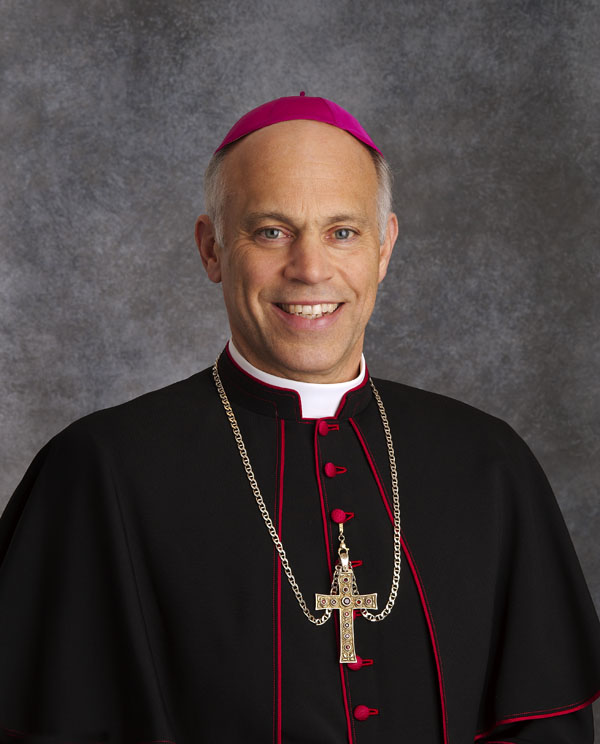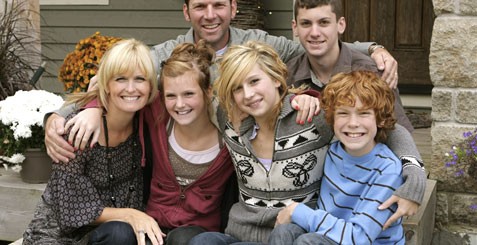Good News in Louisiana
For the first time since last summer’s Supreme Court decision in U.S. v. Windsor, marriage advocates won a marriage case in federal court. In the case of Robicheaux v. Caldwell, the U.S. District Court for the Eastern District of Louisiana ruled that Louisiana’s marriage amendment defining marriage as the union of one man and one woman and disallowing the recognition of valid out-of-state same-sex “marriages” does not violate the U.S. Constitution.
Regarding the federal court decisions striking down state marriage laws, Judge Feldman said: “The federal court decisions thus far exemplify a pageant of empathy; decisions impelled by a response of innate pathos” (p. 26 of the opinion, available in full here).
He goes on to say: “Perhaps that is the next frontier, the next phase of some ‘evolving understanding of equality,’ where what is marriage will be explored. . . . For example, must the states permit or recognize a marriage between an aunt and niece? Aunt and nephew? Brother/brother? Father and child? May minors marry? Must marriage be limited to only two people? What about a transgender spouse? Is such a union same-gender or male-female? All such unions would undeniably be equally committed to love and caring for one another, just like the plaintiffs. Plaintiffs’ counsel was unable to answer such kinds of questions; the only hesitant response given was that such unions would result in ‘significant societal harms’ that the states could indeed regulate. But not same-gender unions. This Court is powerless to be indifferent to the unknown and possibly imprudent consequences of such a decision. A decision for which there remains the arena of democratic debate” (pp. 27-29).
Please see the USCCB media release, quoting Archbishop Cordileone!
Archive
Weddings and Religious Freedom
Over at the Touchstone blog is an article about the Giffords, who have been fined $13,000 by the state of New York because of their refusal to host a lesbian “wedding” on their farm.
Archive
Tennessee Law Upheld
A Tennessee state trial court on August 5 upheld Tennessee’s non-recognition of a valid out-of-state same-sex “marriage.” This is the first win for marriage in court since U.S. v. Windsor.
In his decision, the judge said, regarding the definition of marriage: “The Court also finds that this should be the prerogative of each State. That neither the Federal Government nor another state should be allowed to dictate to Tennessee what has traditionally been a state’s responsibility, which is to provide a framework of laws to govern the safety and wellbeing of its citizens.” Regarding Windsor, the judge said, “The Windsor case is concerned with the definition of marriage, only as it applies to federal laws, and does not give an opinion concerning whether one State must accept as valid a same-sex marriage allowed in another State. . . . The Supreme Court does not go the final step and find that a State that defines marriages as a union of one (1) man and one (1) woman is unconstitutional.”
Archive
Child Welfare Provider Inclusion Act
Yesterday, U.S. Senator Mike Enzi (R- Wyo.) and Representative Mike Kelly (R- Pa) introduced the Child Welfare Provider Inclusion Act. This Act is meant to protect organizations who provide child welfare services, such as foster care and adoption, when they have convictions that a child should only be placed with a married mother and father. Currently, a number of organizations are unable to be of service because of their beliefs about marriage.
Three USCCB Chairmen (Archbishops Cordileone, Lori, and Wenski) gave their support to this bill, noting that, “Indeed, women and men who want to place their children for adoption ought to be able to choose from a diversity of adoption agencies, including those that share the parents’ religious beliefs and moral convictions.”
The Pennsylvania Catholic Conference also indicated their support for the Bill, noting, “In 2012, Catholic Charities helped complete over 3,000 adoptions and foster care placements, including permanent homes for over 1,600 special needs or “hard-to-place” children. By allowing a diversity of providers through the Inclusion Act, we will be putting the needs of children first and also protecting the religious liberty of long-serving child welfare providers.”
Archive
VA Catholic Conference Statement on Appeals Decision
The U.S. Court of Appeals for the 4th Circuit ruled today in a two-to-one decision that Virginia’s marriage law is unconstitutional.
Bishop Paul S. Loverde and Bishop Francis X. DiLorenzo released a statement about the ruling, saying, “We will continue to affirm the truth about marriage, the lifelong union of one man and one woman, as well as the importance of marriage to the common good. As pastors, teachers, and faith leaders, we can do nothing less. We will continue to fight this unjust ruling.”
Archive
Archbishop Cordileone Responds to Recent Federal Rulings
Check out the press release from the USCCB about the recent rulings on marriage in federal courts. As Chairman of the Subcommittee on the Promotion and Defense of Marriage, Archbishop Cordileone reminds us, “Recent court decisions on marriage in no way deter our efforts to promote the truth about marriage – a truth that no court decision can ever undo.”
Archive
European Court for Human Rights
On July 16th, 2014 the European Court of Human Rights ruled that not extending the right to marry to same-sex couples does not violate the European Convention on Human Rights.
The petitioner to the court in this case was a man in Finland who had gone through a sex change and wanted to change his identity. He was told that if he was to do so, he would no longer be recognized as married to his wife: that marriage could be dissolved or transformed into a civil partnership.
The court explained that the European Convention “enshrines the traditional concept of marriage as being between a man and a woman.” Therefore it does not require acceptance of same-sex unions.The majority of the countries in the European Union maintain the true meaning of marriage as a bond between one man and one woman.
There’s an article about this ruling and its possible implications for American at Aleteia.
Archive
Florida Keys Marriage Decision- Updated 7. 23
Yesterday a Circuit Judge in the Florida Keys ruled that Florida’s ban on same-sex “marriage” is unconstitutional.
The judge noted, “The court is aware that the majority of voters oppose same-sex marriage, but it is our country’s proud history to protect the rights of the individual, the rights of the unpopular and the rights of the powerless, even at the cost of offending the majority.” In fact, in Florida, 62% of the voters approved a marriage amendment to recognize the truth that marriage is the union of one man and one woman.
Instead of asking the question of whether those voters had a rational basis for their belief about marriage— which is distinct from a belief about the rights of individuals– the judge in this case dismissed those beliefs as just another kind of prejudice.
There is a great need to educate people about the crucial distinction the Church and others make between the person and their sexual expression. The person is always respected; certain sexual activity may not be.
Archbishop Wenski released a statement about the decision. He reaffirmed the importance of marriage to society and the right of a child to be raised by his or her mother and father.
Archive
Utah to go to Supreme Court
Reprinted from CNS News Brief
Utah to appeal ruling on same-sex marriage ban to U.S. Supreme Court
SALT LAKE CITY (CNS) — Utah’s attorney general said July 9 the state will go straight to the U.S. Supreme Court in hopes of overturning a federal appellate court’s ruling that overturned the state’s ban on same-sex marriage. On the same day in neighboring Colorado, a judge overturned that state’s ban on same-sex marriage. The decision by Colorado District Court Judge C. Scott Crabtree “advances a misinterpretation of the institution of marriage in modern society, reducing marriage to a sheer emotional arrangement that can simply be redefined to accommodate the impulses of culture,” said a July 10 statement by Colorado’s Catholic bishops. “As Catholics, we have a duty to protect and preserve marriage as the union of one man and one woman in our laws and policies. We are called to make this stand because redefining marriage will only further erode the family structure of our society,” the bishops added. Colorado and Utah were two of six states affected by a 2-1 decision issued June 25 by a three-judge panel of the 10th U.S. Circuit Court of Appeals that said states could not deprive people of the right to marry because they chose partners of the same sex. The other four states are Kansas, New Mexico, Oklahoma and Wyoming. It marked the first time a federal appellate court had struck down state same-sex marriage bans. Crabtree’s ruling marked the 16th time a state judge had overturned its state’s same-sex marriage prohibition. In both cases, the judges put their rulings on hold pending probable appeals.
Archive
Colorado same-sex ruling
A state judge in Colorado’s Adams County district court struck down the ban on gay “marriage” on July 9th. Judge Crabtree wrote that, “The Court rejects the State’s attempt to too narrowly describe the marital right at issue to the right to marry a person of the same sex.” He immediately stayed his ruling, reaffirming that this issue will largely be up to the Supreme Court to determine.
Archive
Kentucky News
A federal judge struck down Kentucky’s restriction of marriage to man and woman. The decision is on hold for appeal.
Archive
Indiana Bishops’ Response to Marriage Decision
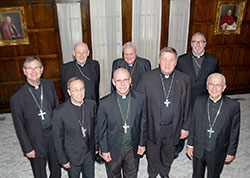
Yesterday, the U.S. District Court for the Southern District of Indiana ruled that Indiana’s definition of marriage as the union of one man and one woman is unconstitutional and that the state’s non-recognition of out-of-state same-sex “marriages” is unconstitutional. Indiana will be appealing the decision.
The bishops of Indiana issued a statement about the decision, noting that it, “ignores this fundamental and natural truth of marriage and opens its definition to the whims of public opinion.”
Archive
Archbishop Cordileone responds to concerns regarding the March for Marriage
A number of officials from San Francisco and a number of other groups wrote to Archbishop Cordileone last week to urge him not to join the March for Marriage on June 19. They argued that the March for Marriage was a platform for hate.
Archbishop Cordileone responded yesterday to the Lt. Governor Newsom and Mayor Ed Lee, pointing out that the March for Marriage, “is not ‘anti-LGBT’ (as some have described it); it is not anti-anyone or anti-anything. Rather, it is a pro-marriage March… Rest assured that if the point of this event were to single out a group of individuals and target them for hatred, I most certainly would not be there.”
He goes on to encourage his correspondents not to take hearsay for truth and corrects a number of assertions about the organizers of the event. He states his willingness and interest in meeting the letter signers in person, not only to talk about the issue, but simply to get to know them, writing, “It is the personal encounter that changes the vision of the other and softens the heart.”
The Archbishop ends his letter with a plea of his own: “When all is said and done, then, there is only one thing that I would ask of you more than anything else: before you judge us, get to know us.”
Archive
Oregon Update
The SCOTUS has determined not to block Oregon’s same-sex “marriages”.
Archive
March for Marriage Promotional Video
The National Organization for Marriage has put out this promotional video for the March on June 19th. Check it out and join us for the March for Marriage!
Archive
Bishop Loverde Encourages Participation in March for Marriage
In an article in the Arlington Catholic Herald entitled “Stand for Marriage, Stand for Faith”, Bishop Loverde encourages the faithful to participate in the March for Marriage on June 19th.
He writes, “I know that some you have resigned yourselves to the redefinition of marriage, or perhaps are not convinced that defending the true definition of marriage is essential to the well-being of society, but I urge you, by example and prudent and thoughtful words, to stand for marriage at this critical time in our history. This is a fight worth having, and the time is now! As I wrote to you when we voted on marriage here in Virginia, ‘Preserving and promoting marriage is an integral component of our shared civic responsibility.’ “
Archive
Archbishop Chaput on Catholic Witness and the March for Marriage
Archbishop Chaput has a column today about Catholic witness and the march for marriage.
He reminds us that: “Our task as believers is to live and to witness what we know to be true — and to do it without rancor or disrespect for those who believe differently.” Chaput notes that, “The Christian faith is personal but never private. It always has a community dimension. It always has public obligations.”
He urges participation in the March for Marriage: “Cultures change when people change. And people change through the word and witness of other people. This is a moment to show our support for the nature of the family and the integrity of marriage as foundation stones of our life as a nation. Please make every effort this year to join the March for Marriage.”
Archive
The Beatitudes, Marriage, and Family (Part 4 of 9)
Blessed are the meek, for they shall inherit the earth. (Mt 5:5)
As by the gentleness of our minds Christ dwells in us, we also shall be clothed with the glory of His renewed body. (St. Hilary of Poitiers)
We tend to think of meekness as simply another word for wimpiness, or at best a sort of extreme humility (“extreme” in the pejorative, fanatical sense). But this is not quite the sense of it. Instead, perhaps it’s better characterized as a slowness to anger, a kind of self-control. As the Dominican theologian Servais Pinckaers (d. 2008) put it:
We all know the force we have to exert over ourselves when we feel our anger rising or when we are stung to envy or jealousy or seized by any passion, if we want to preserve a modicum of calm, self-control and meekness with regard to another person and remain reasonable and fair. Far from being associated with weakness, true meekness is rather the outcome of a long struggle against the disordered violence of our feelings, failings, and fears. In such instances meekness implies tremendous inner strength and merits the praise of the Book of Proverbs: He who is slow to anger is better than the mighty, and he who rules his spirit than he who takes a city (16:32).
So meekness is not mere passivity or weakness, but maintaining a profound calm and control over our feelings and knee-jerk reactions; St. Thomas Aquinas (d. 1274) says that meekness “restrains the onslaught of anger” (Summa Theologiae II-II, 157, 1). Where is this virtue better learned than in the family?
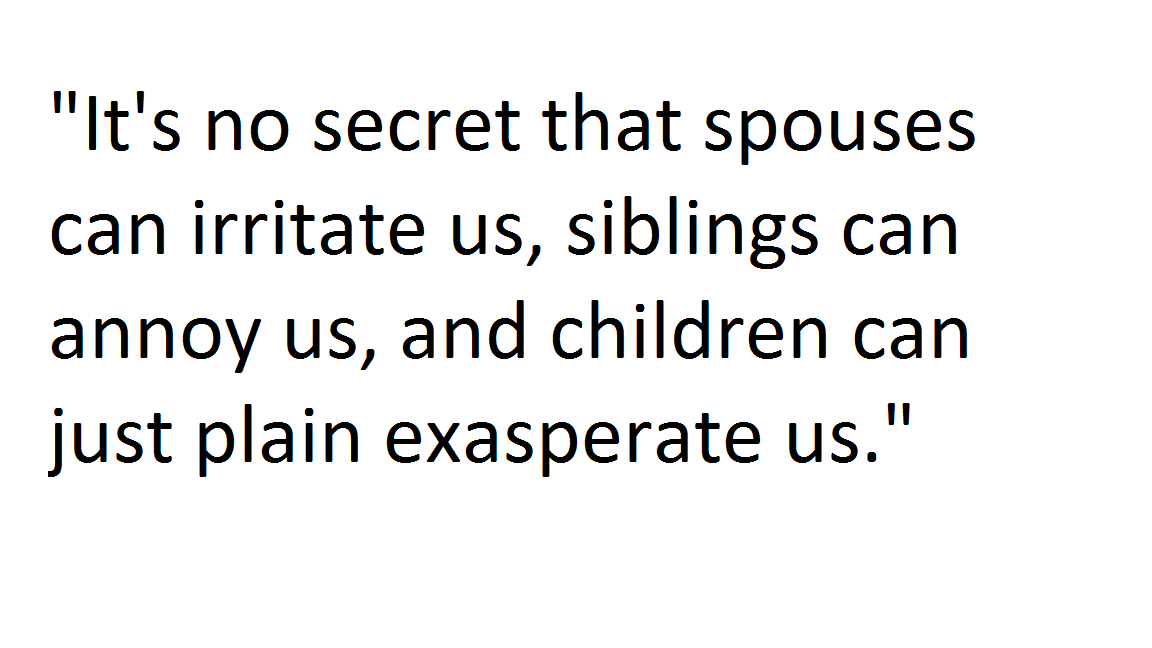 It’s no secret that spouses can irritate us, siblings can annoy us, and children can just plain exasperate us. It’s meekness that keeps us from snapping back angrily with unkind words or actions. As with many virtues, we learn it by doing it—so the very family members who most try us also give us some of the best opportunities to learn how to be meek.
It’s no secret that spouses can irritate us, siblings can annoy us, and children can just plain exasperate us. It’s meekness that keeps us from snapping back angrily with unkind words or actions. As with many virtues, we learn it by doing it—so the very family members who most try us also give us some of the best opportunities to learn how to be meek.
Husbands and wives can live with this meekness towards each other too: difficult though this may sometimes be, ultimately this virtue helps in living out what the real meaning of marriage calls for: giving of oneself.
Of course, giving of oneself is at the very heart of marriage and is in fact indispensable to it: marriage is a total gift of self of a man to a woman and a woman to a man. By its very nature, love is fruitful; the total gift of self that should pervade the whole of a marriage is given expression in the conjugal act, which alone is able to bring forth the fruit of a new life—a sexual act between two men or two women is not able to bring forth this fruit, so a total gift of self cannot be given. (This is also one of the main reasons that we are called to refrain from using contraception. Contraception is neither open to life nor truly unitive; likewise, sexual acts between two members of the same sex are neither open to life nor truly unitive. Since neither of these is able to involve a total gift of self, neither of these is an adequate expression of the authentic meaning of marriage.)
Returning to meekness, then, the husband and wife who cultivate the virtue of meekness towards each other are thereby enabled to love each other more fully and perfectly. By doing precisely this, they become better able to “lead a life worthy of the calling to which [they] have been called” (Eph 4:1), namely, marital happiness leading at last to eternal beatitude.
* The quote above is taken from Servais Pinckaers, O.P., The Pursuit of Happiness—God’s Way: Living the Beatitudes, trans. Sr. Mary Thomas Noble, O.P. (Eugene: Wipf and Stock Publishers, 2011), 61.
~
This series is a guest contribution by a Dominican student brother who has been fulfilling his pastoral ministry assignment by serving as an intern at the USCCB’s Secretariat for Laity, Marriage, Family Life, and Youth.
Archive
The Beatitudes, Marriage, and Family (Part 3 of 9)
Blessed are those who mourn, for they shall be comforted. (Mt 5:4)
God’s mercies are always greater than our troubles. (St. John Chrysostom)
One is almost tempted to think that this promise of comfort somehow doesn’t cut it, doesn’t reach the extent and the weight of the mourning. For when we think of someone mourning, we think of grief, tears, lamentations, deep sorrow. And indeed, some of the greatest sufferings in our lives involve our marriages and families: arguments, illnesses, difficult relationships, and deaths. We not only experience our own sufferings, but often we experience even more intensely the sufferings of our loved ones. In the face of our anguish, what does it even mean to be comforted anyway?
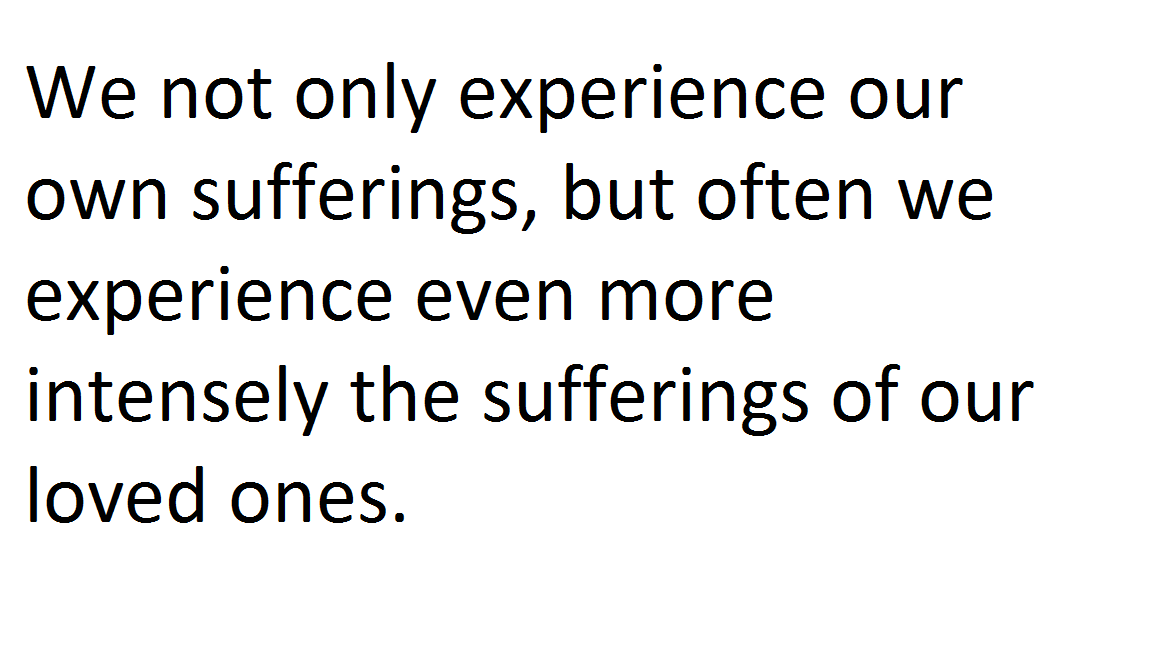 As it happens, Scripture talks about comfort all the time. St. Paul writes: Blessed be the God and Father of our Lord Jesus Christ, the Father of mercies and the God of all comfort, who comforts us in all our afflictions, so that we may be able to comfort those who are in any affliction, with the comfort with which we ourselves are comforted by God (2 Cor 1:3-4); Isaiah writes: Comfort, comfort my people, says your God. Speak tenderly to Jerusalem, and cry to her that her warfare is ended, that her iniquity is pardoned, that she has received from the Lord’s hand double for all her sins (Is 40:1); St. John writes: And I will pray the Father, and he will give you another Counselor, to be with you for ever, even the Spirit of truth, whom the world cannot receive, because it neither sees him nor knows him; you know him, for he dwells with you, and will be in you (Jn 14:16).
As it happens, Scripture talks about comfort all the time. St. Paul writes: Blessed be the God and Father of our Lord Jesus Christ, the Father of mercies and the God of all comfort, who comforts us in all our afflictions, so that we may be able to comfort those who are in any affliction, with the comfort with which we ourselves are comforted by God (2 Cor 1:3-4); Isaiah writes: Comfort, comfort my people, says your God. Speak tenderly to Jerusalem, and cry to her that her warfare is ended, that her iniquity is pardoned, that she has received from the Lord’s hand double for all her sins (Is 40:1); St. John writes: And I will pray the Father, and he will give you another Counselor, to be with you for ever, even the Spirit of truth, whom the world cannot receive, because it neither sees him nor knows him; you know him, for he dwells with you, and will be in you (Jn 14:16).
The word “Counselor” in John’s Gospel may also be translated “Advocate,” “Helper,” “Paraclete” (which is simply the Englishification, if you will, of the Greek word), or even “Comforter.” At any rate, in each of these passages it’s the same word (parakaleō) being used over and over again.
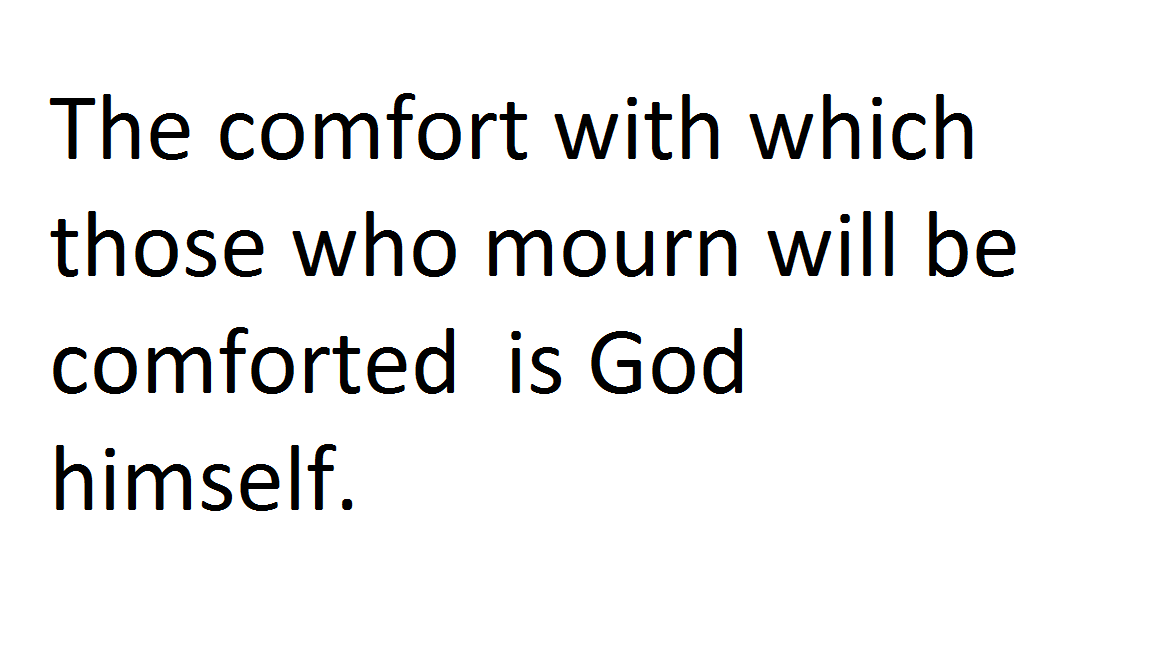 But let’s look a little closer: in 2 Corinthians, the comfort is said to come from the Father, who is “the God of all comfort”; in Isaiah, the coming comfort is the Incarnation, when the very Word of God takes human flesh to redeem us—it is Christ who brings the comfort of redemption to a people afflicted by sin (here the word almost seems too weak!); and in John’s Gospel, the Holy Spirit is the great Comforter who comes to dwell within us. It is therefore not at all a stretch to say that the comfort with which those who mourn will be comforted is God himself.
But let’s look a little closer: in 2 Corinthians, the comfort is said to come from the Father, who is “the God of all comfort”; in Isaiah, the coming comfort is the Incarnation, when the very Word of God takes human flesh to redeem us—it is Christ who brings the comfort of redemption to a people afflicted by sin (here the word almost seems too weak!); and in John’s Gospel, the Holy Spirit is the great Comforter who comes to dwell within us. It is therefore not at all a stretch to say that the comfort with which those who mourn will be comforted is God himself.
This is good news for marriages and families. It’s already been mentioned that some of life’s greatest mourning happens in our married and/or family life, but sometimes spouses and families seem incapable of adequately consoling our sorrow. But we learn from Scripture that those who mourn are comforted with the very life of the Trinity, a comfort that reaches to the deepest depths of our being and raises us up to the heights of beatitude.
~
This series is a guest contribution by a Dominican student brother who has been fulfilling his pastoral ministry assignment by serving as an intern at the USCCB’s Secretariat for Laity, Marriage, Family Life, and Youth.
Archive
USCCB Media Release on OR and PA Marriage Decisions
The USCCB sent out this media release in response to the Oregon and Pennsylvania rulings this week.
An excerpt: “Children deserve a mother and a father, and marriage is the only institution that unites children to their own moms and dads,” the Archbishop said. “We need policies and laws that encourage strong, permanent and faithful marriages, and that help young people marry before having children.”

